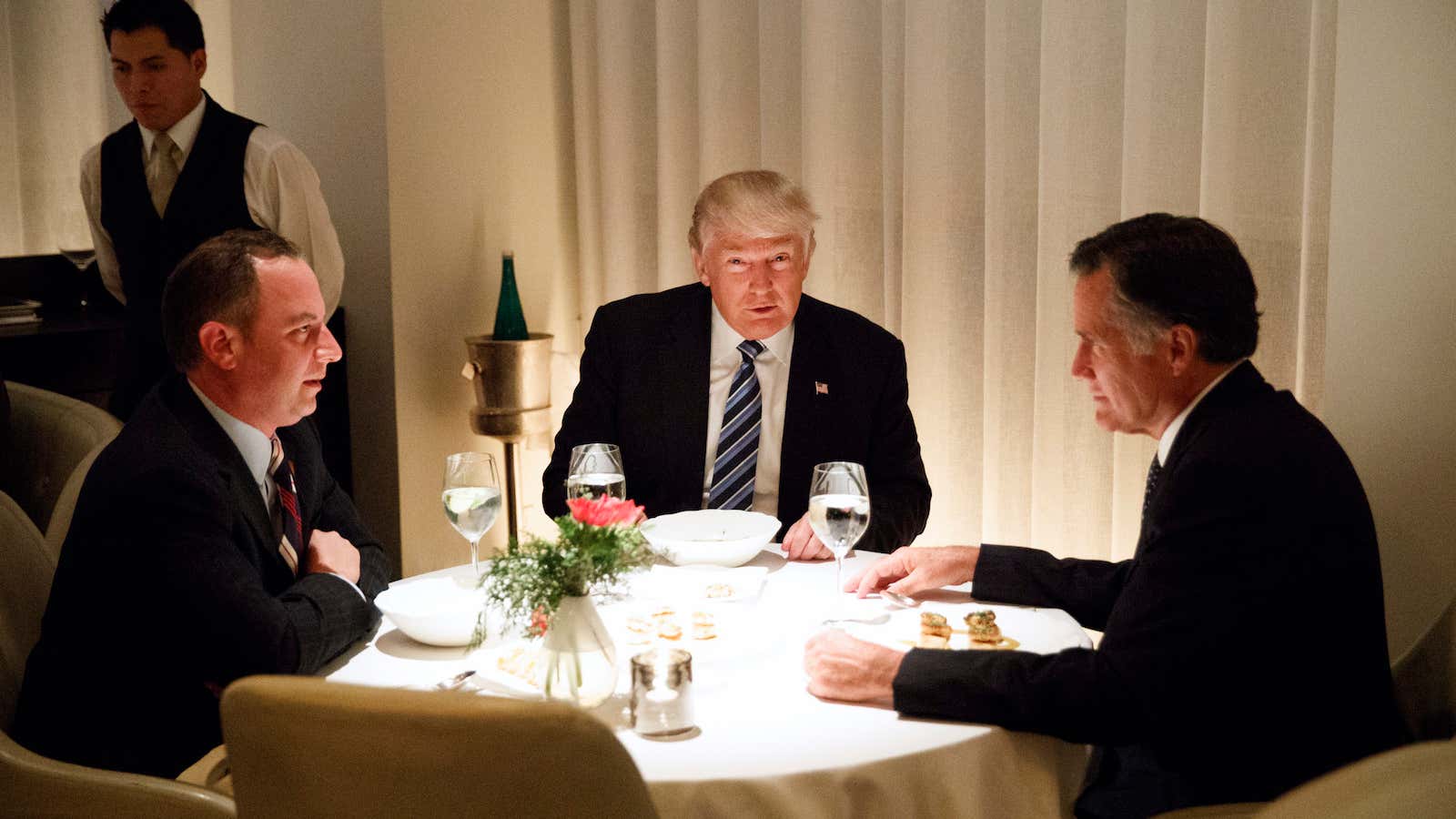US president-elect Donald J. Trump took to Twitter early on Wednesday morning to make some important, but vague, announcements: He will be leaving his “great business in total” and will be getting “completely out of business operations.” Further details are expected at a Dec. 15 press conference with his children, he said.
The tweetstorm came just hours after he wrapped up dinner with his former adversary, Mitt Romney, and Republican National Committee chairman Reince Priebus—at a Trump property in New York City. The dinner illustrates perfectly why, as president, Trump needs to not only get out of “business operations” but he and his family need to liquidate the Trump businesses entirely, as other presidents have done in the past, and even the Wall Street Journal’s right-wing editorial page has demanded.
Romney, who once called Trump a “phony” and a “fraud” who was grifting his way to the White House, emerged after dinner at Manhattan’s Jean-Georges—a three-Michelin-star restaurant inside the Trump International Hotel—to tell assembled reporters that he had “increasing hope that President-elect Trump is the very man who can lead us to that better future.” Romney said he was “impressed” by the Trump transition team, and “enjoyed it very, very much,” though an oft-tweeted photo of the event seemed to suggest otherwise.
Neither Romney nor the Trump team provided any further information on what the three discussed, whether Romney stood a better chance of being chosen as secretary of state after their talk, or who picked up the check.
But the specifics of what the three ate were parceled out to the press, and diligently reported: diver scallops with caramelized cauliflower and caper-raisin emulsion; young garlic soup with thyme and sautéed frog legs; steak for Trump and Priebus, and lamb for Romney; followed by a chocolate cake. The meal appeared to pull elements of Jean-Georges’ $218 per person tasting menu together with those from the $138 prix fixe (add $25 more for the steak or $15 for the lamb).
No one opted for the $45 caviar supplement, but nearby, a waiter made “fresh marshmallows,” as a CNN reporter tweeted. (He had reserved a table at the restaurant on a tip the three would eat there.)
They had water, not wine, although a bottle in a photo suggests it was not New York City tap. All together, the bill for the three of them, including New York City’s 8.875% tax and a 15% tip, could have easily reached $600—about what the average American family spends on food in a month.
That comparison is particularly relevant because as the president-elect, Trump’s transition costs are paid for via $7 million in Congress-appropriated funds. If he picked up the check, the answer to who really paid the bill is a simple one—US taxpayers. If Romney paid, that’s likely to have come out of his own, fairly hefty, wallet.
And one beneficiary is likely the Trump Organization, but thanks to the opaque way the Trump family businesses are handled, it is impossible to tell how, exactly.
Jean-Georges, the “signature restaurant” of Trump International Hotel & Tower on Central Park, was mentioned by name in most major news outlets in America. Namesake chef Jean-Georges Vongerichten and his business partner Phil Suarez benefit directly from the bill, but the publicity the event generated also spotlighted the Trump-branded building, home to a 22-story hotel where a room this Friday starts at $785 a night, and another 166 apartments, the cheapest of which is on the market for $1.1 million.
While the building itself is owned by General Electric Pension Trust, the Trump Organization partnered with the fund manager to develop it in the mid-1990s, and was so involved that Trump himself insisted on the exterior glass that made it “sparkle like a diamond,” as he said at the time. He earned an estimated $50 million for “guiding” the refurbishment and sale of apartments. The building appears to have an ongoing licensing agreement with Trump, but as with the details of most of Trump’s businesses, and his personal finances, the terms of that are not disclosed.
Even if Trump separates himself from the family business entirely, those businesses will still benefit when, as president, he gives publicity (and potentially taxpayer dollars) to the properties and businesses that bear his name. If Trump announces anything less than a liquidation of the Trump Organization on Dec. 15, those conflicts will still exist.
